
AMPHIBIAN & REPTILE CONSERVATION
metrics 2024
Protecting Biodiversity, One Species at a Time
Introduction
AMPHIBIAN & REPTILE CONSERVATION, published by the Amphibian Conservation Research Center & Lab, is a leading journal dedicated to the field of herpetology and environmental conservation. With an ISSN of 1083-446X and an E-ISSN of 1525-9153, this journal serves as a vital resource for researchers, conservationists, and students interested in the preservation of amphibian and reptile species. The journal has achieved remarkable rankings, categorized in the Q2 quartile for Animal Science and Zoology, Ecology, and Nature and Landscape Conservation as of 2023, reflecting its significant contribution to the scientific community. Over the converged years from 2016 to 2024, the journal has established itself as an integral platform for disseminating research findings, fostering collaboration, and enhancing the understanding of biodiversity and ecosystem dynamics. By embracing an open-access approach, AMPHIBIAN & REPTILE CONSERVATION ensures that critical research is readily available to a global audience, promoting informed conservation efforts and policy advocacy to safeguard these vital species amidst their declining populations.
Metrics 2024
 0.39
0.39 1.30
1.30 1.10
1.10 13
13Metrics History
Rank 2024
Scopus
IF (Web Of Science)
JCI (Web Of Science)
Quartile History
Similar Journals

AMPHIBIA-REPTILIA
Pioneering Discoveries in Zoology and EcologyAMPHIBIA-REPTILIA, published by BRILL, stands as a prominent journal in the field of zoology and ecology, specializing in herpetology, the study of amphibians and reptiles. With a rich history since its inception in 1980, this journal aims to disseminate high-quality, peer-reviewed research that advances our understanding of these vital vertebrate groups. Holding a commendable 2023 Q2 ranking in both Animal Science and Zoology and Ecology, Evolution, Behavior and Systematics, it is recognized for its contributions to the scientific community. Researchers are encouraged to submit their manuscripts, benefiting from the journal's commitment to academic excellence, which is showcased in its operational transparency and rigorous editorial process. Though currently not open access, the journal's findings are pivotal for advancing conservation efforts and ecological studies, making it an essential resource for scholars, professionals, and students invested in these important fields.
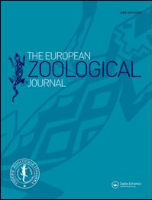
European Zoological Journal
Exploring the Wonders of ZoologyEuropean Zoological Journal, published by Taylor & Francis Ltd, is an esteemed open-access publication dedicated to advancing the exciting field of zoology. Since its inception in 2017, this journal has progressively established itself as a vital resource for researchers, professionals, and students alike. With its Q2 ranking in Animal Science and Zoology as of 2023, the journal ranks in the 69th percentile among its peers, showcasing its influence and contribution to the discipline. The journal’s broad scope covers a wide range of topics within zoology, aiming to foster an understanding of animal biology and conservation efforts. As an open-access journal, it not only enhances the dissemination of knowledge but also encourages collaborative research across global communities. Situated in the United Kingdom, the European Zoological Journal invites submissions that contribute to the evolving discourse in animal sciences, and endeavors to support the scientific community in addressing pressing ecological challenges.

CONSERVATION GENETICS
Innovating Strategies for Ecosystem SustainabilityCONSERVATION GENETICS is a leading journal dedicated to the study of genetic diversity and its implications for conservation biology. Published by SPRINGER in the Netherlands, it serves as a vital resource for researchers, professionals, and students interested in the intersection of genetics and environmental stewardship. With an ISSN of 1566-0621 and a focus on articles published since 1994, this journal currently holds impressive rankings, including Q2 in Ecology, Evolution, Behavior, and Systematics and Q3 in Genetics as of 2023, making it a pivotal platform in these fields. Although not an Open Access journal, it provides substantial insights into conservation strategies and genetic research, facilitating the understanding of species preservation and biodiversity. By contributing to the discourse surrounding genetic factors in conservation, CONSERVATION GENETICS underscores the importance of integrating genetic knowledge for effective management of natural resources and ecosystem sustainability. Join a community of scholars committed to advancing the science of conservation genetics through innovative research and collaborative inquiry.
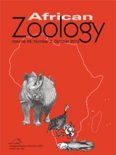
AFRICAN ZOOLOGY
Championing Conservation Through ResearchAFRICAN ZOOLOGY, published by Taylor & Francis Ltd, stands as a significant journal in the realm of Animal Science and Zoology, with a proud history dating back to 1996 and slated to continue until 2024. With an ISSN of 1562-7020 and E-ISSN 2224-073X, this journal provides a reputable platform for researchers and practitioners dedicated to the study of animal biology across the African continent. It has been recognized for its quality scholarship, evidenced by its Q3 categorization in the 2023 Scopus quartile rankings and an impressive rank of #182 out of 490 within its field. As an open-access journal, it facilitates the dissemination of vital research findings and promotes broader accessibility, catering to a diverse audience of professionals, scholars, and students alike. The journal aims to enhance our understanding of wildlife, conservation, and ecosystem dynamics in Africa, fostering collaborations that address critical ecological challenges. For researchers and enthusiasts keen on contributing to and staying informed about advancements in zoological science, AFRICAN ZOOLOGY is an essential resource that enriches the global discourse on biodiversity and conservation efforts.
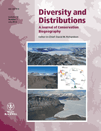
DIVERSITY AND DISTRIBUTIONS
Unraveling the complexities of ecological distributions.DIVERSITY AND DISTRIBUTIONS is a leading journal in the field of ecology, evolution, and systematics, published by WILEY. With an impressive impact factor and designated as Q1 in its category for 2023, this journal ranks 49th out of 721 in the Scopus database, placing it in the top 93rd percentile among its peers. The journal has been committed to advancing knowledge since its inception in 1998 and has embraced Open Access since 2019, ensuring that research is accessible to a broad audience globally. By publishing high-quality, peer-reviewed articles that explore biodiversity patterns, conservation strategies, and ecological dynamics, DIVERSITY AND DISTRIBUTIONS plays a crucial role in fostering discussions that help to understand and mitigate global ecological challenges. Located in the United Kingdom, this journal serves a diverse community of researchers, professionals, and students, making significant contributions to science and policy regarding biodiversity and its distributions.
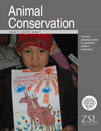
ANIMAL CONSERVATION
Championing Research for the Future of Wildlife.Animal Conservation is a prestigious journal that serves as a vital platform for the dissemination of research dedicated to the preservation of wildlife and habitats. Published by Wiley, this journal has established a significant presence in the fields of Ecology and Nature and Landscape Conservation, holding a distinguished Q1 category ranking for both in 2023. With an impressive Scopus rank of #25 in the realm of environmental science, it caters to a global audience keen on understanding and addressing pressing conservation issues. The journal provides researchers, professionals, and students with high-quality, peer-reviewed articles that explore innovative methods and strategies in animal conservation. With its continuous publication since 1998, encompassing a comprehensive range of topics, Animal Conservation is indispensable for anyone aiming to make impactful contributions to the field of ecology and conservation biology.
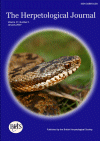
HERPETOLOGICAL JOURNAL
Bridging science and conservation for a healthier ecosystem.Herpetological Journal, published by the British Herpetological Society, is a prominent platform dedicated to publishing high-quality research in the fields of herpetology, ecology, and conservation. With its ISSN 0268-0130, this journal has established a significant presence in the academic community, especially as it continues its publication journey from 1987 to 2024. Notably, the journal boasts a commendable impact factor, being ranked in the second quartile (Q2) for Animal Science and Zoology, and holds a third quartile (Q3) ranking in other essential categories including Ecological Modeling and Ecology, Evolution, Behavior and Systematics. The Herpetological Journal serves as an indispensable resource for researchers, professionals, and students, fostering the exchange of innovative ideas and insights crucial to the understanding of reptiles and amphibians. Although the journal currently does not offer open access, it remains a vital choice for those invested in the ongoing dialogue around herpetological studies and nature conservation.
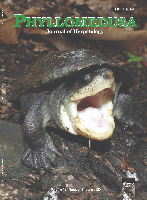
PHYLLOMEDUSA
Empowering researchers to share groundbreaking zoological insights.PHYLLOMEDUSA is a distinguished, peer-reviewed journal dedicated to the fields of Animal Science and Zoology and published by UNIV SAO PAULO, ESALQ in Brazil. With an Open Access model in place since 2002, PHYLLOMEDUSA provides a vital platform for the dissemination of research findings, ensuring that quality scholarly articles are freely accessible to a global audience. The journal currently holds a Q3 classification in its category and ranks #375 out of 490 in Scopus, reflecting its commitment to fostering scientific dialogue and advancing knowledge within the community. Covering a diverse range of topics related to amphibian biology, ecology, and conservation, the journal invites contributions from researchers and professionals alike, empowering them to share innovative insights and collaborative studies that address contemporary challenges in zoological sciences. With a converged publishing timeline extending from 2005 to 2024, PHYLLOMEDUSA remains a pivotal resource for academics, students, and practitioners eager to stay abreast of the latest developments in the field.
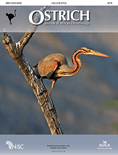
OSTRICH
Connecting Science and Conservation through Avian StudiesOSTRICH, a distinguished journal published by Taylor & Francis Ltd, serves as a pivotal platform for disseminating research in the fields of ecology, evolution, behavior, and systematics. With an ISSN of 0030-6525 and an E-ISSN of 1727-947X, this journal has been contributing vital insights to the scientific community since its inception in 1930. Maintained in the UK, OSTRICH holds a respectable Q3 category ranking in the 2023 Ecology, Evolution, Behavior, and Systematics quartiles and ranks 408th out of 721 within its scientific domain according to Scopus, showcasing a competitive position within the 43rd percentile. OSTRICH is committed to publishing high-quality research that informs conservation efforts and biodiversity studies, making it an essential resource for researchers, professionals, and students interested in avian biology and related ecological fields. While not currently an open-access journal, OSTRICH offers varied access options through institutions and libraries, further widening its reach and impact within the scientific community. We invite academics and practitioners to explore its valuable articles that drive forward innovations in avian research.
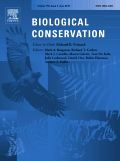
BIOLOGICAL CONSERVATION
Pioneering Insights for Effective Ecosystem Management.BIOLOGICAL CONSERVATION, published by Elsevier Science Ltd, is a leading international journal dedicated to advancing the science and practice of biological conservation. Since its inception in 1968, the journal has provided a critical platform for researchers, professionals, and students in the fields of Ecology, Evolution, Behavior, and Systematics as well as Nature and Landscape Conservation. With an impressive impact factor, and ranked in the Q1 category within both ecological and conservation domains in 2023, it emphasizes high-quality empirical and theoretical research essential for understanding and addressing pressing environmental challenges. Although it follows a subscription model, the journal is known for its rigorous peer-reviewed articles that contribute significantly to the field, ensuring that the latest findings and methodologies are readily accessible to practitioners. As a vital resource for those engaged in conservation efforts globally, BIOLOGICAL CONSERVATION stands out for its commitment to enhancing knowledge and informing strategies that safeguard biodiversity across ecosystems.